Held at William & Mary in Williamsburg, VA (check out Hu’s post on their gorgeous library space!) The Innovative Library Classroom (TILC) is a “day-long conference dedicated to the exploration of innovative practices related to teaching and learning in libraries” (source). There was a whole crew representing ZSR – Hu, Meghan, Kaeley, Morgan, and Kathy. Here are our takeaways.
Morgan @ TILC
The Innovative Library Classroom (TILC) is a new-to-me conference but one I hope to attend regularly from here on out. Not only were there innovative practices to be had but I also had the fortunate opportunity to experience all of these new practices with four exceptional colleagues!
“Tell Me a Story: Utilizing Storytelling to Teach Difficult Topics” – Brittany Rochelle Norwood (Washington & Lee University)
I actually wasn’t planning on attending this session but, when a last minute change in the schedule left me with an open slot I slid into this session and I’m glad I did. The premise of Brittany’s presentation, as the title may suggest, is scaffolding one-shots through the lens of storytelling, creating a more engaging and supportive space for encountering information literacy. As Brittany pointed out early in her presentation, teaching is equally performance and instruction. When considering how to structure an instruction session, especially on a difficult topic – which Brittany describes as anything that is “complex, nuanced, unrelatable, abstract, or easily dismissed” – Brittany highlighted the following benefits of thinking about instruction as storytelling:
- Storytelling condenses information and keeps complexity
- Keeps things relatable and human
- Creates a model
- Promotes self awareness, discovery, accommodates a variety of perspectives
So what does this look like?
- Determine your learning objectives.
- Frame the “narrative” of your session. Where do you want your students to end up by the end of your instruction? Let this guide the plot conventions that drive your instruction. For example, do you want students to have an understanding of how to evaluate a source? Framing your instruction through the lens of the “unreliable narrator” or “narrative with a twist-ending” can be useful. What other plot lines from famous fairy tales and fables can you utilize here?
- Identify potential peaks and valleys in your performance. A “peak” is the natural high during a “performance” (or instruction) where students pay the most attention. These are excellent spots for most important points. A “valley” are the natural breaks or “lows” where students may lose interest. These become excellent spots to consider adding a “twist” or sharing a relatable, personal experience into your narrative.
- Adapt and/or develop activities to help your narrative unfold. Valleys are a great time to incorporate any relevant activities you develop. Additionally, consider breaking the activity into smaller “chunks” that are completed over the course of the instruction, actively involving students in the narrative.
I appreciate Brittany’s presentation because it felt like a new way of thinking about something that can feel very tired and repetitive (and, also, sending me down the rabbit hole of Centaur skeletons → https://strangeremains.com/2014/07/26/the-skeletal-anatomy-of-the-centaur-of-volos/ ) I’m looking forward to seeing what new “instruction stories” I can craft through this lens!
A few other links and highlights from the day:
- A goldmine of possible content for active learning exercises “The Yes Men” → https://theyesmen.org
- A great example of how (expert) information changes over time → “This Is Why Eating Healthy Is Hard (Time Travel Dietician)” by Funny or Die https://www.dailymotion.com/video/x5vptwr
- Moving from CRAAP to ACT Up (plus Underrepresented Researcher Aggregators!) → https://docs.google.com/document/d/1HAgXPQTIwmpE2uyofA37gCU-VFO4uk9VYlPctCAuYoU/edit?usp=sharing
- Gagne’s Nine Events of Instruction (from a lightning talk on creating engaging and interactive asynchronous learning materials) → https://www.niu.edu/citl/resources/guides/instructional-guide/gagnes-nine-events-of-instruction.shtml
Kathy @ TILC
I haven’t attended TILC since 2018, when it was held at Radford, so it was nice to return to this conference at its new home at William & Mary. (I had also never been to W&M or Colonial Williamsburg!)
As always, the TILC organizers do a great job of welcoming people in and creating a conference that is both rich in content and manageable in size. I also enjoyed exploring Swem Library at William & Mary and meeting some new colleagues at other NC libraries!
“Does This Look Relevant to You? Using Insights From Information Retrieval Studies to Facilitate Student Source Selection, Reading, and Use” – Anne Jumonville Graf (Trinity University, TX)
Graf teaches a class at Trinity on Information Behavior, and in this session, she investigated the concept of “relevance” as it’s discussed in information retrieval studies, rather than information literacy. Although relevance is a core concept in IL and we deal with it in very practical ways, we don’t clearly define what it means (there are only 2 passing references to it in the Framework).
Graf drew extensively from the work of Tefko Saracevic (2016) for this presentation. Saracevic identifies five “relevance dimensions” that reflect how we actually make relevance judgments and what factors go into those decisions, rather than prescribing how we “should” make those judgments.
- Subject view (knowledge, literature) [objective?]
- System/algorithmic [objective?]
- Cognitive (‘pertinence’)
- Situational (‘utility’)
- Affective (‘motivation’)
Graf provided reflection questions for us as instructors and for students to consider as we move through each of these dimensions. She encouraged us as instructors/librarians to consider what facet/dimension we emphasize/de-emphasize when we work with students to select sources. What assumptions of “user behavior” do we have about students? These often come through in the sequences and scripts we regard as the “best” way to do research or develop information literacy. How do we account for the affective dimensions of the information search process in a class context?
My biggest takeaway was to think through how I can make my own relevance judgments more transparent for students, and to give them an opportunity to share their own rationale for determining relevance in a non-evaluative way. This would also be useful in my PRS with students as we review results in a database and make decisions about which ones appear most relevant, and how to increase relevance based on their needs using keywords and other tools within the database.
Graf also acknowledged that the information search process is constantly evolving, and the information retrieval process has to change along with it. Many of our current platforms, for example, are organized around, not what information you explicitly searched for, but what content the algorithm has chosen to provide to you (e.g. TikTok). In that scenario, you as the user are no longer deciding what is “relevant” for you. How does that then change our perception of relevance?
This was a topic I had not given much thought to prior to the conference, but I have already ordered Saracevic’s book for the library and look forward to learning more!
My other highlight is not necessarily conference-related. As it was my first time in Colonial Williamsburg, I had to take a little detour to check out Shields Tavern, which my husband’s family has traced back to their ancestors! It is only open for private events, so sadly I did not get to partake in the beef and beer advertised on the placard outside. But they do sell tavern merch in the gift shops 😉 (No family discount, though.)
Meghan @ TILC
It was great to be back at TILC (my first post-Covid experience at this wonderful regional conference)!
On Thursday evening, Kaeley and I shared our experiences in designing and teaching LIB 290: Research and Creative Practice with our poster presentation “Library as Studio: Fostering Artistic Exploration and Creation in a Library Class”. It was great to share our assignments and scaffolded research projects with colleagues from across the region. Several librarians were interested in using some of our activities for one-shot instruction and/or workshop opportunities at their own libraries to support emerging artists in their communities. Our poster and supplemental materials can be found here.
Additionally, I want to reiterate Hu’s thoughtful post on our tour of Swem Library at William & Mary. This was my second visit to this space, but I noticed new artwork and updates in spaces and service since the last time. The artwork and massage chairs really stood out!
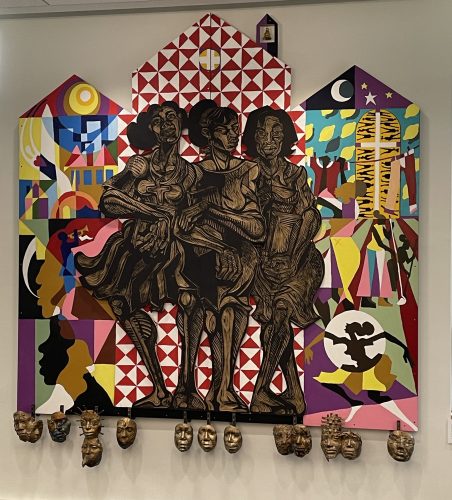
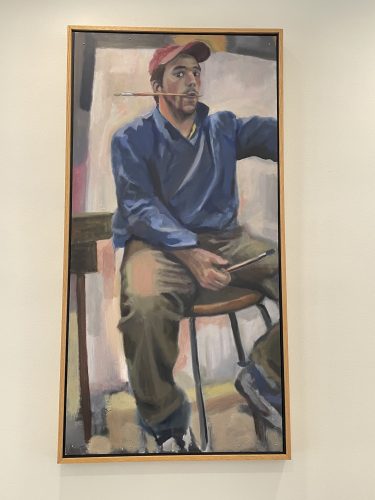
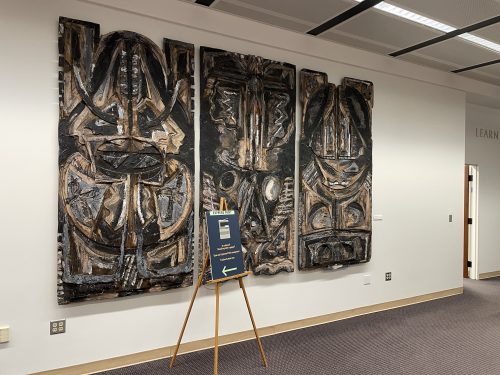
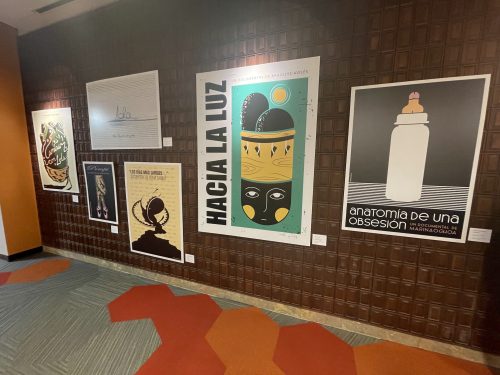
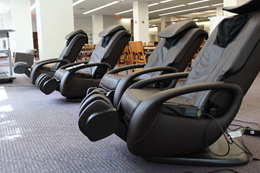
“A Collaborative Approach to Finding and Using Data in a First-Year Writing Course” – Patrick Rudd, Shannon Tennant & Chrissy Stein (Elon University)
Our friends from Elon University had a wonderful session on integrating a scaffolded approach to teaching data literacy in a first year writing course. These librarians worked closely with Elon’s “First Year Foundations” courses (ENG 1100 and COR 1100, similar to our WRI 111 and FYS 100 courses) to develop a series of 3 instructional sessions that covered an introduction to library services and academic research, introduction to quantitative data, and an introduction to qualitative data. For several of my WRI 111 courses, I lead instruction sessions to aid in some sort of advocacy letter / controversy mapping project that is similar to the argumentative letter assignment in which Elon students were asked to incorporate qualitative and quantitative data– so I really appreciated their approach to breaking down this instruction into smaller, more relevant sessions dependent upon which aspect of their assignment they were working on. Also, the focus on data competency and media literacy is something that I intend to further develop in my LIB 100 class in the fall.
For further information, you should be able to view the session materials once TILC has them posted on their website
Kaeley @ TILC
This was also my first time at TILC, and I thought it was a great one-day conference that covered a lot of ground on the topic of instruction in libraries. I would highly recommend it to anyone who hasn’t had a chance to attend yet! Several of the sessions I attended have already been discussed, so I will highlight:
Contributing to the Scholarly Conversation: Using Asset-Based Pedagogy in the Library Classroom – Erin Durham Wright (University of Maryland, Baltimore County)
Asset and strengths-based pedagogies have been developed in contrast to the deficit model of education. The deficit model focuses on how the individual student is lacking, and what they don’t know, which can lead to students feeling disengaged from and disenfranchised by the educational system. It also doesn’t recognize the ways in which educational policies, systems, and structures can impede individual learning.
Asset and strengths-based pedagogies focus on creating an educational environment in which students feel like they can contribute to their education, because it builds on what they already know and recognizes their strengths and contexts. Wright gave five principles and applications:
- Center social interaction and community knowledge
- Create opportunities for genuine engagement
- Work against systems of educational oppression
- De-center classroom learning
- Honor prior knowledge
She shared an example of this type of exercise, a three-minute free-write:
- What is my topic & why am I interested in it?
- What do I already know about it?
- What do I need to find and explore?
For more information can be found at:
- tinyurl.com/TILCtoolkit (presentation slides, assignment/activity examples, be logged in to Google to view)
- “The Problem with Grit: Dismantling Deficit Thinking in Library Instruction”
- Dismantling Deficit Thinking in Academic Libraries: Theory, Reflection, and Action (on order)
Hu @ TILC
Like others, this was my first TILC at William & Mary, and while I always enjoyed it at Radford, the Education building at William & Mary was an amazing venue for this always excellent conference! I’ve always enjoyed the poster sessions the evening before and should mention that several people commented on the excellent poster presentation by Meghan and Kaeley “Library as Studio: Fostering Artistic Exploration and Creation in a Library Class” I also enjoyed the session on incorporating reflection in IL.
Think About It: Incorporating Reflection in Information Literacy Instruction – Elizabeth Sanders, (Lamar University)
Information literacy instruction often includes hands-on activities for students to practice and apply their research skills. This session discussed Kolb’s four stages of learning, giving reflection equal importance. Additionally, Dweck’s growth mindset concept and the challenges it can present as a deficit approach. This session described experiences incorporating reflection into a credit-bearing course and one-shot sessions as well as how these were adapted to asynchronous and virtual models during COVID.
The session had great examples of how Kolb’s experiential learning cycle fits into common IL activities citing sources:
Kolb’s Experiential Learning Cycle
Concrete Experience
Reflective Observation
Abstract Conceptualization
Active Experimentation
Example translating Kolb to citing sources
AC: ID info required
AE: Filling out citation step by step
CE: Practicing for different source types
RO: Reviewing and Correcting errors
Taking the time for learner reflection can be a challenge, but it was useful to attend a session that reminded me of the value of that reflection in learning.





6 Comments on ‘TILC 2023: What informs your pedagogy?’
I am so jealous! Thank you all for detailing your experiences at TILC! I went for the first time last year and will definitely go back next year.
Love these write-ups! May try to make room in my calendar to attend next year. Such good food-for-thought as we spend the summer planning for classes!
Thanks for sharing, I love these group blog posts!
All of these sessions sound really fascinating– so glad y’all had such a good experience!
I learned some things! Thanks!
Really interesting content! Thanks for sharing the info, and all the links!